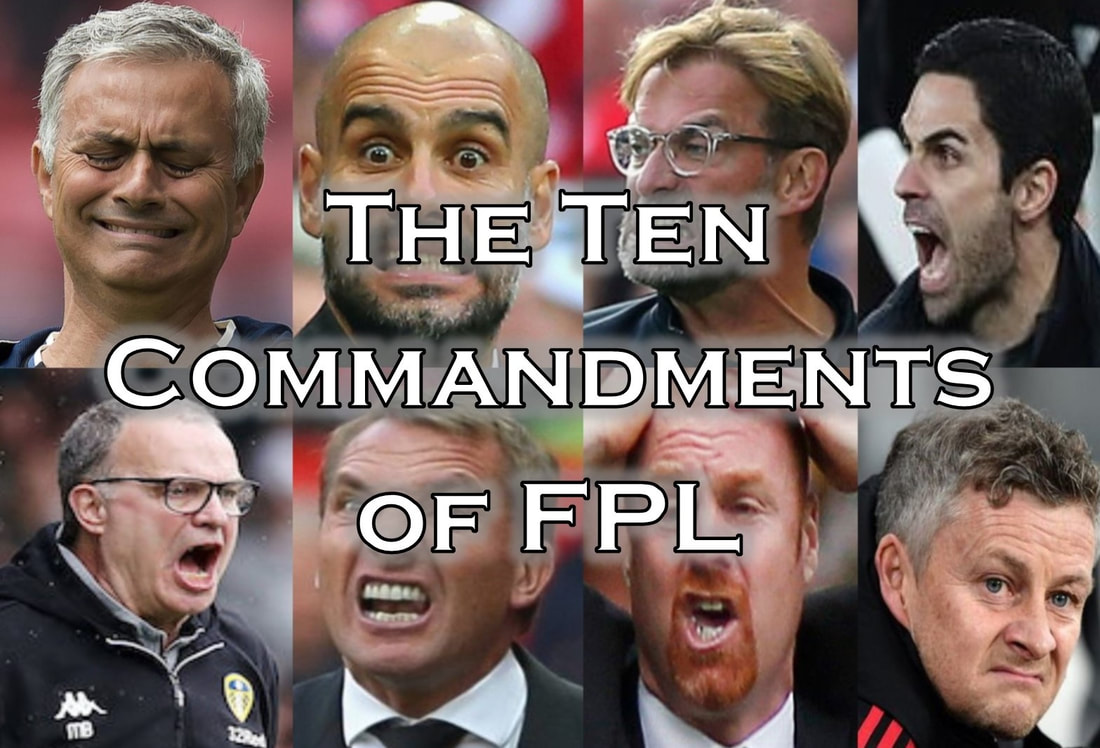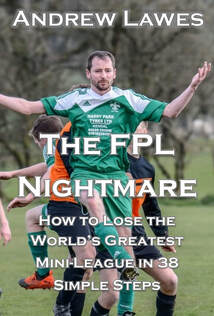|
Based on the advice of far more successful players than me, these are the ten rules to follow in order to maximise your FPL performance, win your mini-league and secure your best season yet Last season, I sourced 21 Golden Rules for FPL from the FPL Community on Twitter. They turned out, as a whole, to be somewhat contradictory, although they did help lead me to my highest-ever Overall Ranking. This season, instead of taking advice from an open forum, I have taken what certain high-finishing accounts have been suggesting as the best approach, I have conferred with my friend who finished 7,046 in the world, and the 21 Golden Rules have been narrowed down to the Ten Commandments of FPL. By following these ten guidelines, I expect my highest-ever overall rank to be surpassed even further this season and, with determination, consistency and courage, I hope to finally finish inside the top ten thousand. Here are my Ten Commandments for success in FPL. 1. Captain the Obvious Captaining maverick choices will only lead to disappointment. More often than not, they underperform, and you have to watch as your rivals, who captained de Bruyne and Salah, pull further away in the rankings. The worst-case scenario for many managers is when they captain a maverick and it pays off, such as Pukki’s hat-trick against Newcastle or Antonio’s four goals against Norwich. This convinces us that ‘fortune favours the brave,’ and that memory lingers far longer than the five or six subsequent gameweeks when you take a gamble and it backfires. Maverick captaincies will not get you into the elite finishing positions; over time, they will decimate your chances of success. Salah, de Bruyne, Mane, Aubameyang, Sterling and Bruno are all midfielders this season, getting the same points for goals, assists and clean sheets. These are the power players; your captain should always come from that group. 2. Control Your Hits Last year, my associate won our mini-league without taking a hit all season. The world number one, Joshua Bull, won the whole game without taking a hit, even burning a few transfers on occasion. The potential risk for hits is high; the potential reward is minimised. Hits should never be taken for defenders and goalkeepers, because the gamble is too high – one fluke shot and they score two points max; factoring in the hit, that’s a score of minus-two for the week. If your original defender or goalkeeper plays, you’re four points down; if they return, you’re looking at a deficit of eight or more points. That’s not to say hits should never be taken – after Bull, you had to go to 53 in the Overall Rankings to find a manager that didn’t take a hit. The key is minimising the risk. Never hit for one-week gambles – only do so if the new signing is likely to outscore the player he replaces over the next few weeks. If you have injuries, suspensions or blanks, sometimes a hit can be the shrewd move in this situation, as your new signing will likely outscore the non-playing player by two points just for playing, making it, essentially, a two-point hit. There is an argument that you sometimes need to take a hit for a defender to facilitate a different premium attacker; with proper planning, you should mitigate the need for this at all. 3. Avoid Opposing Players This game is all about maximising potential returns and minimising potential failure. If you have one of your attackers playing one of your defenders, you are minimising your potential returns. If your attacker scores, your defender can only receive two points. If he assists and gets a yellow card, you are only getting six points from two players. Sometimes these predicaments are unavoidable, which is why you should always be planning three or four weeks ahead, to minimise the risk of these situations. You need to maximise your potential at all times, even if that means leaving a potential points-scorer on the bench. The only viable exceptions to this rule are Trent Alexander-Arnold, Andy Robertson and Matt Doherty, who carry a high attacking threat which they have translated into steady attacking returns over the last two seasons. 4. Select Proven Players As repeatedly stated, this game is about mitigating risk and maximising potential. The best way to do this, especially in pre-season, is to fill your squad with proven FPL point scorers. We know the likes of Salah, Aubameyang and de Bruyne will score upwards of two hundred points. We think the Leeds goalkeeper Meslier will prove a solid selection, but we know McCarthy, for the same price, will get consistent scores. We think Ziyech and Werner will deliver for Chelsea, but we know Son and Jimenez, in the same positions, will bring home the bacon. The Premier League is the most physically-intense, high-profile division in the world of football. Players instantly performing to their maximum potential, like Bruno Fernandes or Papiss Cisse, is rare. Bringing in FPL debutants can pay off, but filling a team with them can force mass changes early doors. The key is starting with the proven assets while retaining the ability to switch to the new boys if they hit the ground running. 5. Plan Ahead The key strategy to any game, from snooker to chess, is the ability to see three or four moves ahead, to anticipate what will happen and how you will react to maximise your chances of success. Rushing out to sign a player who has just scored twice is tempting, especially if they have Aston Villa next. However, if their next four games are Liverpool, Sheffield United, Manchester City and Wolves, their appeal is much diminished. Likewise, if your premium attacker has gone two games without a goal and has Spurs up next, the urge will be to sell. If their subsequent three matches are Newcastle, West Brom and Fulham, however, the strategic move is to keep them, knowing their fixtures will change for the better. The other aspect to this is planning future transfers. If you know a player you like has a run of green fixtures coming up, be ready to bring them in. If you know that they will miss a gameweek, ensure you have a plan to sell them or cover on the bench. If one of your defenders is playing one of your attackers in a few weeks, have a plan to make sure you don’t need to have two opposing players in your team. 6. Sign Players Who Outperform Position Some of the most valuable assets in FPL are those who outperform the position they play. The clear examples of this are midfielders who play as strikers, such as Martial last year, and defenders that play as midfielders, with Lundstram epitomising that last season. Someone who plays further forward than their classified FPL position will receive more opportunities to influence play, to assist and to score. With midfielders getting an extra point for a goal or a clean sheet than a striker, and defenders getting an extra point for a goal and three points for a clean sheet, these players can become must-haves. In addition to this, attacking full-backs can be gold. Alexander-Arnold, Robertson and Doherty perform less like defenders and more like wingers who get four points per clean sheet, and are all valued £7.5m or lower. No player valued at £7.5m or lower scored more points than those three, so there can be an advantage to opting for an extra one of those three than a mid-price attacking midfielder. Below them, the likes of Stevens at Sheffield United, Aurier at Tottenham and Pereira or Chilwell of Leicester can, with the right run of fixtures, prove far more effective than McNeil, Ward-Prowse and Saint-Maximin – similarly-priced players who return inconsistently. 7. Only One Defender and Attacker Per Team This is related to the ‘maximising potential’ maxim. If you have two or three attacking players per team, you are relying on that team scoring two or more goals, and those players being involved in them, to get big points from your players. Should that team fail to score, your attacking points returns are severely stunted. Likewise with the defensive double-or-treble up – all it takes is one fluke goal for your back-line’s returns to be non-existent. For Gameweek 38 last season, many Free-Hitters gambled on a triple-Burnley defence against Brighton. When the Seasiders scored twice, they consigned the Burnley Treblers to just three points from three players. These circumstances are to be avoided as much as possible. There are outliers to this, though. A cheap defender who is rising in price, like Lundstram last season or Wan-Bissaka the season before, is a viable option for your substitute’s bench even if you have one of their team-mates. We all need cheap subs, and these should not be discounted just because you have another player from their team starting. The other outlier is if a team is on a rampage. Given Liverpool’s defensive strength and the attacking potential of their players, two from Robertson, Alexander-Arnold and van Dijk will produce rewards in the long-term. Likewise, a Salah-Mane double-up, two from Sterling, de Bruyne and Mahrez and two from Martial, Bruno and Rashford will produce regular points over several weeks. The key is ensuring that, should you go with these options, you are planning for several gameweeks, not just a one-off week where it can all go horribly wrong. 8. Trust Premium Players No player can return every week. Sometimes, the big players even go two or three weeks without scoring more than two points. The urge in these circumstances is to trade them for another premium player who has just scored twice, a very understandable urge. Aubameyang hasn’t scored in two weeks yet Mane has three in two, I need to get him in, goes the thinking. Yet, when we make the trade, we see Mane blank and Aubameyang smash in a hat-trick. Now, instead of securing three goals over three weeks, we have scored no points for goals from those players. Had we stuck with one of them, then over that three weeks, we would be at least fifteen points better off. If you’re jumping on the premium rotation rollercoaster, there has to be a reason beyond ‘Player A didn’t score this week and Player B did.’ Has Player B got a run of great fixtures, while Player A’s take a turn for the worst? Is Player A over-performing his statistics, while Player B is getting a dozen chances a game? Is Player A carrying a niggling injury, while Player B has regained match fitness? If the answer to these questions is ‘No,’ you’re better off sticking with what you have. 9. Make Transfers As Late As Possible Especially in the early weeks, as the rush to increase team value is at its peak and player prices are most volatile, you see managers making transfers during the gameweek still playing. You see people, furious with a player who has not performed as expected, rage-transfer them out while emotions are still high. You see people, who haven’t thought ahead, bring in the weekend’s top performers while forgetting there is an international break, or a round of cup fixtures, before the next gameweek deadline. You see people make these mistakes over and over again, so often at the detriment of their Overall Ranking, and you see seasons be destroyed over it. We need to avoid this trap to maximise our chances of success. We need to wait until the latest possible minute to make our transfers, when we have the most information possible at our disposal. There’s nothing worse than signing a Saint-Maximin on a Saturday night after a three-assist gameweek, only to hear Steve Bruce say in his press conference that he is managing an injury and will be rested for the next match. There are few things more frustrating than swapping your premium player for another, then finding out his wife has given birth and he won’t be featuring, or he has pulled-up with a groin strain in training, leaving you with a choice of being a premium player down or taking a hit to correct it. The argument, especially in the opening month or so, is that a 0.1m rise in value for a player can cost 0.5m to bring him in, as you need to downgrade another player. Cover this situation by starting with a team value of £99.5m. Leave transfers as late as possible and give yourself the best chance of them coming off. 10. Plan A Chip Strategy The chips available in FPL can give your team a massive boost, which is why it is so crucial to know what you are doing with them. Throughout the season, there will be two or three gameweeks where teams have more than one fixture – what we call ‘Double Gameweeks.’ It is on these gameweeks, which usually occur towards the end of the season, that your Triple Captain and Bench Boost chips should be used. This is a case of playing the percentages; the big teams are the ones most likely to have a Double Gameweek, which means using your Triple Captain on a premium player gives them two matches to maximise a trebled-up score. Likewise, using a Bench Boost on a Double Gameweek – especially if pre-empted the week before by a Wildcard – can give you up to fifteen players playing twice, accumulating scores for your team. Your Free Hit should be saved for a Blank Gameweek, where several teams have no fixture, allowing you to field a full squad without taking several hits or forcing you into building a squad you don’t want in the weeks beforehand. Your Wildcards are your get-out-of-jail free cards; when your team is damaged beyond repair, either from your poor decisions or from injuries, this is a good time to use your Wildcard. Another good time is if several high-scoring players have good runs of fixtures; getting ahead of the game can give you a big advantage over those who delay, waiting for a better time. The key with the Wildcards is they should be used to prepare your squad for several gameweeks, not just one or two. Without an effective chip strategy, you will never achieve the higher ranks of FPL. Using them properly, maximising your chances of success, can see you turn from an FPL journeyman into an elite player. Those are the Ten Commandments of FPL that I will be following this season, as I look to improve on my highest-ever rank. There may be the odd gameweek where I have to break one of them. There may be gameweeks where hits are the strategic move, and I can replace two under-performers with two players on hot streaks. There could be a time where it takes too many transfers to avoid opposing players, and the better plan is to take a diminished gameweek to avoid destroying my squad for the three or four weeks either side. I could plan four weeks ahead, then something happens which forces me to reassess those moves. I may even save my Triple Captain for Gameweek 38, to give myself that extra edge over my mini-league rivals. All I know for sure is, the key to mini-league and overall ranking success is sticking to the Ten Commandments as much as possible. Good luck in the upcoming FPL season. May all your transfers be successes, may all your arrows be green, and may the FPL Gods forever be in your favour. ♦◊♦
Comments are closed.
|
"One of the most insightful works I've read on mental health problems in men ... It is very well-written and a real page-turner. I would recommend it to anyone.
⭐️⭐️⭐️⭐️⭐️" Dancing With Disorder
Hardcover: £19.99 Paperback: £12.99 Kindle: £2.99 "It communicates a deep understanding of troubled individuals who suffer from the challenges of mental disorders ... Courageous, wise, humorous and thought-provoking ... an easy-to-read, surprising and subtly moving chronicle.
⭐️⭐️⭐️⭐️⭐️" The FPL Nightmare: How to Lose the World's Greatest Mini-League in 38 Simple Steps
Hardcover: £19.99 Paperback: £12.99 Kindle: £1.99 The FPL Nightmare II:
The Crying, the Hits and the VAR Probe Hardcover: £19.99 Paperback: £12.99 Kindle: £1.99 The FPL Nightmare III:
The Lawes Rank Redemption Hardcover: £19.99 Paperback: £12.99 Kindle: £1.99 The Complete FPL Nightmare Trilogy:
The Epic Quest From A 4.8m Rank To A Top 0.1% Finish Exclusively available on Kindle: £3.99 Follow Andrew Lawes on Social MediaFPL NightmareHaving completed the FPL Nightmare book trilogy, Lawes now provides weekly video updates on his progress in his new FPL Expert Mode challenge, along with tips and advice for his rival FPL managers.
Of course, the FPL Gods remain bastards, and they conspire to make his advice look foolish. Archives
October 2023
LawesDisorder.com
|










